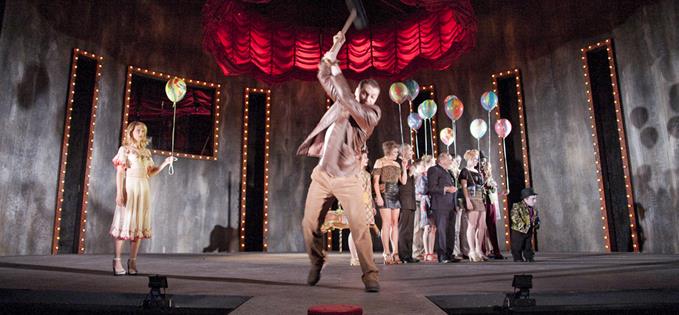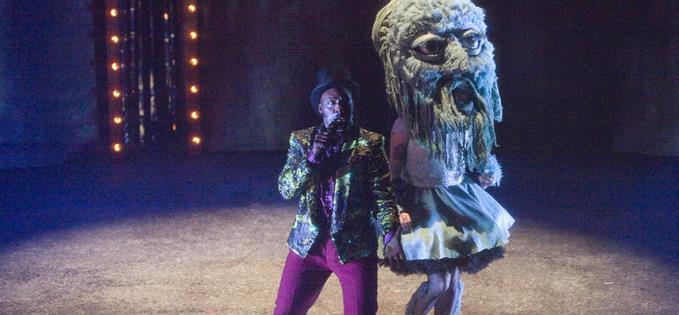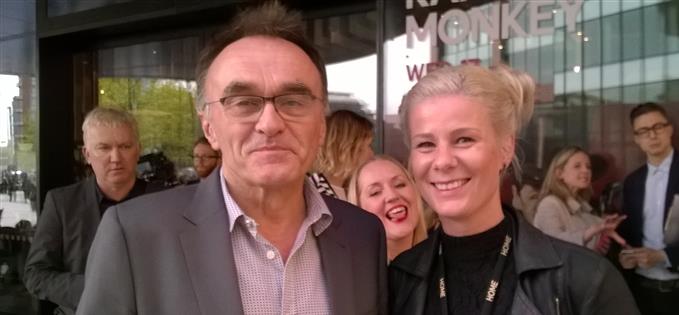The Funfair, an adaptation of Ödön von Horváth's play Kasimir und Karoline by Simon Stephens is very definitely not a comfortable ride. As the official opener of the excellent new theatre at the HOME it is a gritty, gravelly choice, definitely more Rusholme Ruffians than Alton Towers.
With the vicious misogynist bile and rather stereotypical northerners, southerners (and a naive Welshman) there was precious little poetry
The linking of post-crash 1929 Munich and post-crash 2010s Manchester is a heavy-handed and the sexual politics are very odd. Stephens talks about the play as being very Mancunian with its 'compassion for the poor and a celebration of their capacity for poetry and wonder'. With the vicious misogynist bile and rather stereotypical northerners, southerners (and a naive Welshman) there was precious little poetry – a couple of characters pointing heavenwards at Zeppelins or The Great Bear didn't really offset the unease of some of the characters' oft-repeated views – 'Women are like dogshit; all over the place' etc.
But the very stylish and efficient set, a merry-go-round disk circling and tilting with a single horse, great use of silhouettes and sound effects for the rollercoasters and side shows, whirling projections on the transparent curtain and the lights flickering on the rear of the stage like a woozy waltzer, conjured up the grimy otherworldliness of the fair. The musicians in a box, who occasionally wander on stage, were excellent, and really, there wasn't a weak performance in the sometimes thrilling cast.
From the off one was reminded of David Lynch remixing a Corrie omnibus. The diminutive barker hirples onto the stage and intones 'The lights go down ...' and talks about how the funfair 'is the entire world of escape and glory – an explosion of human dirt and magnificence'. We also get the 'Freaks' who were astounding and grotesquely funny plus bursts of violence and some more surreal moments (why was that person trying to eat his hat?).

There was also a dislocated sense of timelessness, the references to Zeppelins mixed with Iggy Pop's The Passenger, the over regard for Mr Smoke who owns a department store 'with four floors!' and a Bentley, a 1930s ambience shot through with a feral twenty-first century underclass.
The play basically revolves around the break-up of Cash and Caroline, Cash having lost his job, Caroline looking elsewhere for some sort of life beyond his self-pity - then the funfair comes to town. It is certainly stylised, but the unevenness, swooping from kitchenny-sink drama ('Get away from here, and get somewhere better', 'people are anxious all the time') to metacommentaries ('The lights rise, we are in the beer tent', Mungo Jerry's In the Summertime), kept tripping me up.
But two hours flew by. The interplay of actors and props, music and costume, swearing and drunkenness kept one, I won't say engaged, more curious. I've mentioned the cast, and it is unfair to single anyone out, but special kudos to Ben Batt's hilariously staggering drunk and self-piteous Cash, and Victoria Gee's arm-bruised, terrified old-before-her time Esther, in terribly odd silver shorts, with a coat tied up around her waist.
Almost despite yourself, you root for them.










 Danny Boyle at the opening night with Elisa Ruff and the head of Sarah Perks
Danny Boyle at the opening night with Elisa Ruff and the head of Sarah Perks 





